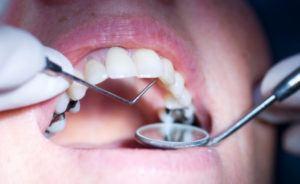Dental Fillings
 Have you ever had a tooth that was really sensitive to sweets? That could be the sign of a growing dental cavity. A dental cavity, which simply means the missing structure in a tooth, is caused by tooth decay. The scientific term for the tooth decaying infection is dental caries, and this decay process is caused by specific types of bacteria that produce acid that can destroy tooth structure. There are hundreds of types of bacteria that can live in the mouth; however, only a few of them have been actually linked to tooth decay. Dental caries is a multifactorial, transmissible oral disease caused by the complex interaction of certain bacteria in plaque with carbohydrates on the tooth surface over time. There are a number of risk factors that contribute to this disease process. If you have any questions about how to help prevent tooth decay, Dr. Street and his team would love to help answer them.
Have you ever had a tooth that was really sensitive to sweets? That could be the sign of a growing dental cavity. A dental cavity, which simply means the missing structure in a tooth, is caused by tooth decay. The scientific term for the tooth decaying infection is dental caries, and this decay process is caused by specific types of bacteria that produce acid that can destroy tooth structure. There are hundreds of types of bacteria that can live in the mouth; however, only a few of them have been actually linked to tooth decay. Dental caries is a multifactorial, transmissible oral disease caused by the complex interaction of certain bacteria in plaque with carbohydrates on the tooth surface over time. There are a number of risk factors that contribute to this disease process. If you have any questions about how to help prevent tooth decay, Dr. Street and his team would love to help answer them.
Occasionally, if weakened tooth enamel (decalcified enamel) is identified before too much tooth structure is lost, then a dental cavity could possibly be avoided if certain oral hygiene habits are modified. However, if the decalcification increases and tooth structure is lost, then a dental filling would be necessary to get the tooth back into a healthy state. A dental filling procedure involves removing infected tooth structure and replacing it with restorative material to help restore function and esthetics to the once decayed tooth.
Did you know that there are multiple options when it comes to the type of material used for a filling? The two main types of dental materials are composite fillings and amalgam fillings. Amalgam fillings (also known as “silver fillings”) have been around for over 175 years. They are a cost-effective solution for filling a cavity; these fillings are long-lasting and durable. However, many patients do not like the appearance of the metal in their mouths. Composite fillings (also known as “tooth colored fillings”) offer an esthetic component to the dental fillings. There is a wide variety of different composite shades to match the exact color of the patient’s tooth. Dental composites have been around since the late 1960s, but the material formulas have changed and improved significantly over the years. Dental composites mechanically bond better to the tooth, transfer less hot and cold sensations to the nerve of the tooth, and typically require less healthy tooth structure to be removed than with amalgam fillings. With the current dental composite formulas, Dr. Street believes that there are relatively few instances in which an amalgam filling would be recommended over a composite filling.
If you have any questions regarding different types of dental fillings, Dr. Street would be happy to help answer them! Give us a call at (918) 488-9770 today!
Accepting New Patients
Looking for a full-service dentist in Tulsa?
At the office of Dr. Scott Street, we offer stress-free family care using modern technology and an old-fashioned personal approach. We provide a full selection of dental treatments, from routine cleanings to top-quality dental restorations. If you are looking for a full-service family dentist in Tulsa, OK, call us today at 918-481-4922 or use our online Appointment Request form.
Office Location
Suite 1107 (11th Floor)
Tulsa, OK 74136
Phone: 918-481-4922
Fax: 918-481-4969
Office Hours
Tuesday 8am - 5pm
Wednesday 8am - 5pm
Thursday 8am - 5pm
Friday 8am - 5pm
Additional times are available.
Dr. Scott Street and the team at T-Town Smiles are proud to be the local Tulsa Dentist serving families in Tulsa, Broken Arrow, Jenks, Oakhurst, Bixby, Glenpool and surrounding Tulsa communities.



